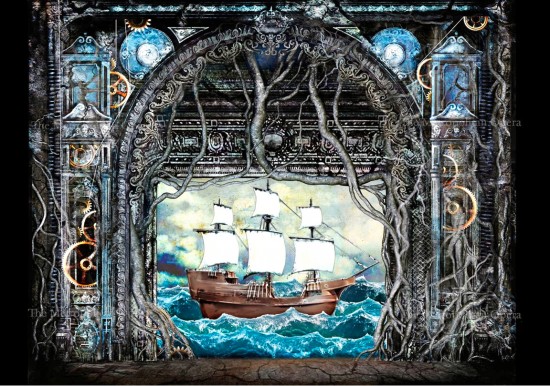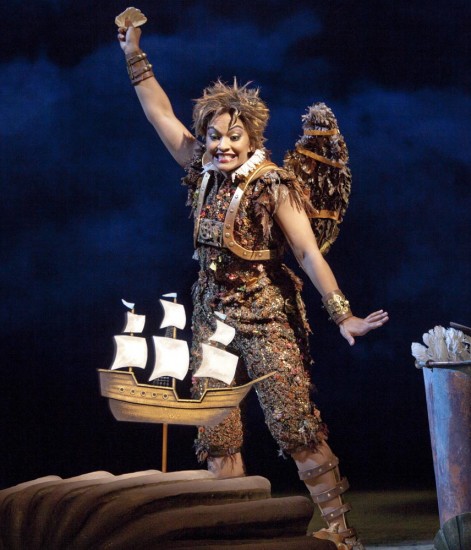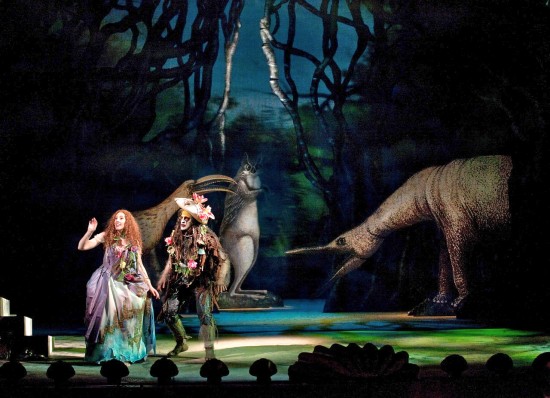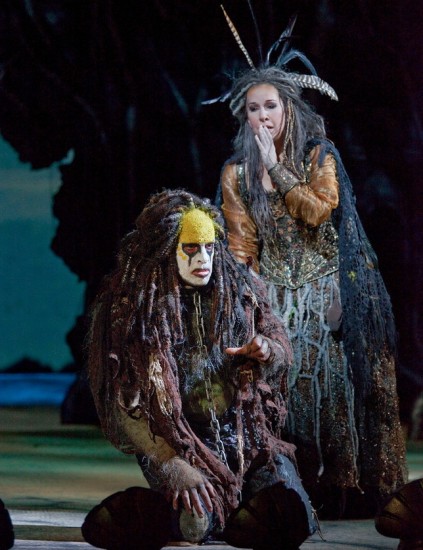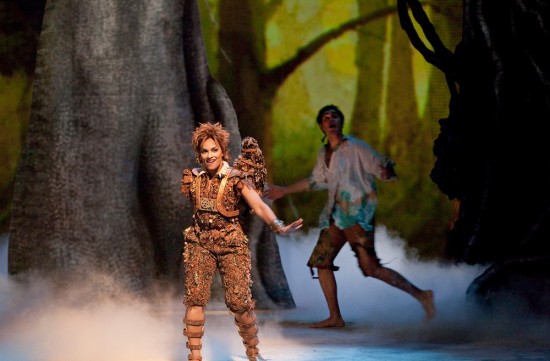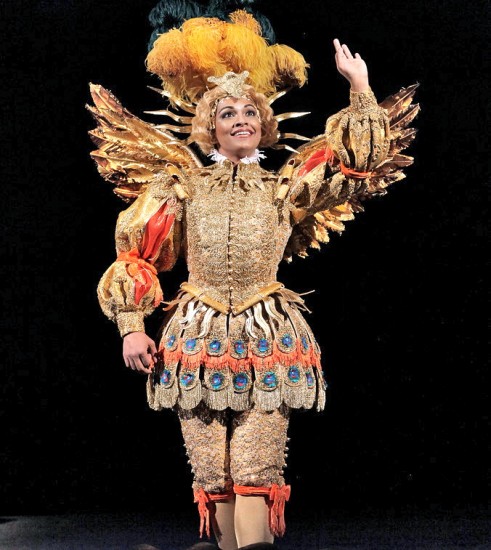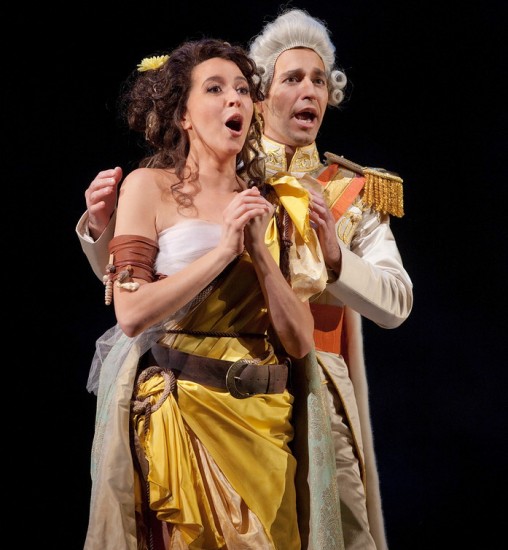You won’t find The Enchanted Island listed in any opera book published previous to this year, because the World Premiere was three weeks ago on New Year’s Eve, 2011-12.
According to the Free Merriam-Webster Dictionary A Pastiche is “A musical, literary, or artistic composition made up of selections from different works,” and The Enchanted Island certainly fits that definition. The music is from rarely played works of George Frideric Handel, Antonio Vivaldi,”¨ Jean-Philippe Rameau, AndrÉ Campra, Jean-Marie Leclair, “¨Henry Purcell, Jean-FÉry Rebel, and Giovanni Battista; the characters are from Shakespeare’s The Tempest and his A Midsummer Night’s Dream and from Greco-Roman mythology; and the basic plot-line is an alternate telling of The Tempest combined with what might be called “the further misadventures of two pairs of mixed up lovers” from A Midsummer Night’s Dream.
I might as well admit from the start that although I enjoy baroque music, it doesn’t excite me the way that Verdi or Wagner do. So I count the musical element as satisfactory but not excellent – feel free to disagree with me on that one.

Paul Appleby as Demetrius, Layla Claire as Helena, Elliot Madore as Lysander and Elizabeth DeShong as Hermia
The story element was . . . – but wait – since it is a world premiere you don’t know the story yet. Only you do, assuming you know the story of The Tempest and recall the two pairs of lovers Demetrius-Helena and Lysander-Hermia (sung, respectively, by Paul Appleby, Layla Claire, Elliot Madore, and Elizabeth DeShong). These four have already lived through their adventures as recounted in A Midsummer Night’s Dream. They are sailing off on a joint honeymoon, but make the mistake of coming dangerously close to Prospero’s island.
Already on the island are Prospero (David Daniels), his 18-year old daughter Miranda (Lisette Oropesa), and his two servants Ariel (Danielle de Niese) and Caliban (Luca Pisaroni) along with Caliban’s mother, the witch Sycorax (Joyce DiDonato). The final Shakespearean character is Prince Ferdinand (Anthony Roth), and the cast is completed by the sea-god Neptune (Plé¡cido Domingo).
If you wanted to send a synopsis of The Tempest on Twitter, you might write: “Prospero wants to end the feud with his brother the Duke by marrying his daughter Miranda to Prince Ferdinand.” Likewise, for A Midsummer Night’s Dream: “Mischievous and/or careless use of a powerful love potion causes romantic misalignments, but all is straightened out at the end.”
Well, Jeremy Sams’ The Enchanted Island combines those two Tweets into a delightful bit of nonsense. Prospero instructs Ariel to use the magic he has taught her to create a storm and drive Ferdinand’s ship ashore on the island, then to cast a spell over Miranda and Ferdinand so they’ll forget all past loves and love each other forever. The spell goes wrong and instead of sinking Ferdinand’s ship Ariel sinks the honeymooners’ ship.
Willing, but not necessarily very bright, Ariel now imitates Puck in bestowing the love potion inappropriately. The first man she sees is Demetrius; she assumes it’s Ferdinand so Demetrius and Miranda are now helplessly in love and sing a charming duet to that effect.
Enter the witch Sycorax, the original owner of the island. Shakespeare paints her as completely evil and has Prospero killing her 12 years before his play begins, but Sams makes her much more human. When Prospero invaded her island and defeated her 12 years ago he did not kill her but exiled her to a remote corner of the island. Sycorax thinks that the time now is ripe for her revenge. She sends her misshapen son Caliban to steal a bottle of dragon’s blood from Prospero’s supply, replacing it with a similar-looking concoction of her own, and mixes her own love potion to use on Caliban and the first available young lady who comes along.
Who, of course, just happens to be Helena in deep grief over being rejected by her husband Demetrius. Sams’ Caliban is also much more human than Shakespeare’s. There is a lovely scene with Helena and Caliban wandering hand-in-hand about the island singing of their love. One is so happy for him that a lovely lady loves him not even noticing his deformed body.
Alas, it cannot last. Sycorax’ magic is not nearly as powerful as Prospero’s and after a while it wears off. Helena runs off saying, “My God! What was I thinking?” Caliban didn’t need the spell to fall in love and grieves to his mother. She gives him some tough love: “That’s life, dear. You just have to suck it up and take the bitter with the sweet.”
Meanwhile, Prospero discovers Ariel’s mistake and is not pleased. He berates her soundly and sends her back to do it right. Instead, she hitches Miranda to Lysander, the only other male currently on the island. In a delightful bit of musical humor Miranda now sings with Lysander the exact same love song that she previously sang with Demetrius.
After a bit they get around to mentioning names and Ariel hears “Lysander” and “Demetrius” – but nary a hint of “Ferdinand”. “Uh-OH,” she says, the light dawning, “I must have sunk the wrong ship. But how do I find the right one?”
She’s too afraid of Prospero’s fury to go back to him for instructions, so she calls on the mighty sea-God Neptune for help.
And it’s time I interrupted this story to mention one of the two ingredients of this performance that was truly excellent – the scenery and stage effects. Just look closely at any of the scenic pictures here and observe the baroque attention to details. Combined with 21st century techniques, the back scrim is used for dynamic projections in a way that can’t be properly appreciated by still photography.
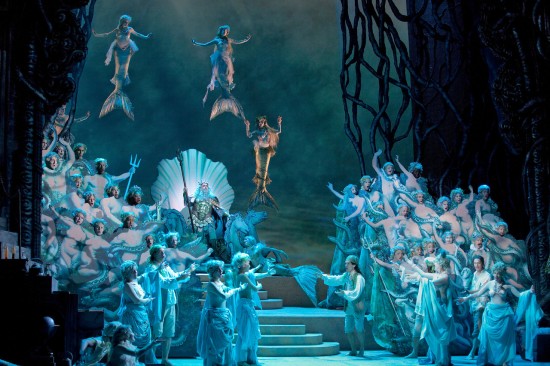
The upcoming entrance of Neptune has got to be one of the most spectacular entrances in all of opera. Before the scene begins we are in a forest grove; through a large gap in the trees at the rear we see a projected picture of the quiescent sea. A spot in the middle of that sea begins to roil and seems to move forward, growing and taking form as it does until we recognize Neptune and his under-water court. Somehow the entire court has managed to squeeze through the narrow opening in the trees and become real three-dimensional beings in the process. To complete the illusion, three mermaids are hovering above the throne, lazily fanning their tails.

Ariel appears wearing an old-fashioned deep-sea divers outfit, complete with a big bell-helmet – which she soon discards because as everyone knows a sprite can breathe equally well in air or water, but she definitely can sing better without the helmet. Plus, we can better see her expressive face.
That face, and the acting that goes with it is the other ingredient of this opera that deserves the epithet “Great”. It has to be seen to be believed. Speaking of which, the MetHD Encore will be playing at a theatre near you at 6:30 pm local time on Wednesday February 8, 2012. Get your ticket now. You may never have another chance.
And that would be a good note on which to end my review. Except I haven’t finished telling you the plot – which is both simple and complex. On the surface the bad magic all gets undone.
Ferdinand shows up, meets Miranda, they need no magic to be smitten with each other, and she gets to sing her love duet with her third and final partner. The honeymooners get to go on honeymooning. Prospero and the Duke are reconciled and he goes home to Italy giving Ariel her freedom and giving the island back to Sycorax.

A thoroughly predictable finale, but Sams has given us more than that. He has made his characters much more human and believable. As early as the end of Act I, Prospero realizes that good intentions are not enough. What better way to end the feud than to marry his daughter to Prince Ferdinand? And look what a mess he’s created! Again in the finale, he rues that he treated Sycorax so badly and begs her forgiveness. In true baroque style that a line worth singing once is worth singing four times, he begs it and begs it and begs it and begs it until Sycorax finally relents, the curtain falls and all-but-one of them live happily ever after.
And there you have it – a joyous new opera. If you haven’t seen it, the MetHD Encore on February 8 is a must. If you were there Saturday, it’s worth seeing again. I’ll be there.
But oh, Jeremy Sams why did you leave such a gaping hole at the end? You brought Caliban to life and made me care for him. You made me feel his estatic human joy in the enchanted scene with Helena – and his human pain in the following scene with his mother. Early in the finale when everyone was singing what they wanted (Ariel wanted her freedom, Sycorax wanted her island, Neptune wanted peace and quiet among these squabbling humans, Prospero wanted forgiveness, etc.) you let Caliban tell us he wanted a woman to help him rule his island – and then you forgot him. You didn’t even do him the dignity of having Neptune (or Sycorax) explain why his wish couldn’t be fulfilled. You just ignored him. Why, Jeremy? Why?

Papagena (Kathleen Kim) and Papageno (Rodion Pogossov) from the Met Performance of Mozart's Magic Flute, December 22, 2008
For my own peace of mind I have made up a solution. I’m going to add a couple more minutes to the finale, extend “Baroque” a few decades to include The Magic Flute, and remind Neptune about Calibanetta, a sweet-voiced young woman with a deformed body but a beautiful spirit who lives in the far reaches of his kingdom. I can’t write the words, and I certainly can’t choose the appropriate music from early Mozart, but think about it Mr. Sams in case the Met remounts The Enchanted Island next year.
Live in HD
metoperafamily.org
Photos, except as noted: Ken Howard/Metropolitan Opera
3000 El Camino Real
Palo Alto, CA 94306
1-800-FANDANGO Exp Code 914#
This review by Philip G Hodge appeared in sanfranciscosplash.com on January 28, 2012.

